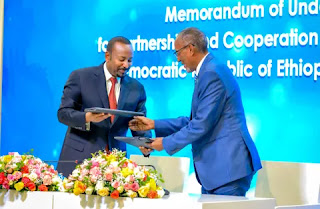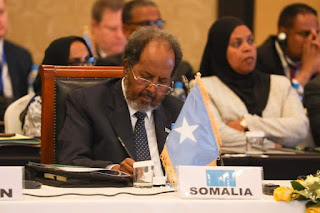FORCED ACCESS TO RED SEA PORT BY ETHIOPIA IS A THREAT TO SOMALIA SOVEREIGNTY
FORCED ACCESS TO RED SEA PORT BY ETHIOPIA IS A THREAT TO
SOMALIA SOVEREIGNTY
The recent
statement made by the Ethiopian Prime Minister, in which he argued that
Ethiopia, being a landlocked country, the authority to use force to attain
access to the sea, is a troubling departure from the principles of global
cooperation and harmonious coexistence. This assertion clearly goes against the
United Nations Charter, international law, and the fundamental values that
support our interconnected global community. The assertion of the right to
access the sea and the disputes surrounding it have been a notable source of
conflict. Nevertheless, it is crucial to differentiate between a nation's
legitimate entitlement to peaceful sea access, as safeguarded by the United
Nations Convention on the Law of the Sea (UNCLOS) and acts of outright
territorial aggression.
Ethiopia's
historical interactions with its neighboring nations have experienced both
positive and negative moments. Nonetheless, asserting the use of military force
to secure maritime access not only endangers these diplomatic connections but
also conveys a concerning message to the global community. Establishing a
precedent where territorial ambitions are justified based on perceived
disadvantages could set a dangerous precedent, potentially endangering both
regional and global stability. If Ethiopia were to act on its assertion, it
could establish a perilous precedent that undermines the painstakingly
established principles of peaceful coexistence among states. This article
highlights the reasons why Ethiopia should not forcibly access red seaports,
what Ethiopia should do to peacefully access red seaport and what Somalia
should do now and, in the future, to avoid such infringement of its sovereignty
by neighboring countries.
WHY ETHIOPIA SHOULD NOT FORCE ITS WAY INTO ACCESSING AND
CONTROLLING RED SEA PORT OF SOMALIA
The issue of
Ethiopia potentially seeking to forcefully access and control a port in Somalia
is a complex and sensitive matter. It is important to note that Ethiopia has
landlocked status and relies on neighboring countries for access to the sea.
Each nation encounters distinctive difficulties, and although being without
access to the sea may present specific economic and logistical limitations, it
should not provide a free pass for a country to violate the sovereignty of its
neighboring nations. The following are the reasons why Ethiopia should consider
relinquish their quest for forceful access to red seaport:
Respect for
Sovereignty and International Law: Somalia is a sovereign nation, and its territorial
integrity and control over its ports are protected by international law.
Forcibly taking control of Red Sea Port would violate Somalia's sovereignty and
international norms.
Regional
Stability:
The Horn of Africa has a history of conflict and instability. Forcing control
of a Somali’s Red Sea Port could escalate tensions in the region, potentially
leading to further instability and conflict. It is in the best interest of
regional stability for nations to respect each other's sovereignty and
territorial integrity. Forceful access and control of the Red Sea Port may lead
to an escalation of hostilities, which can be costly in terms of both lives and
resources. This could be threat to regional stability that is already unstable.
Negative
International Perception and Economic Sanctions: Forcibly taking control of Red Sea
Port in Somalia would likely lead to strong international condemnation. This
could have negative consequences for Ethiopia's international standing and
relationships with other countries. In addition, forcibly accessing red seaport
by Ethiopia could expose them to economic sanctions imposed by international
community. A good example is the current situation between Russia and Ukraine
where EU imposed a number of import and export restrictions on Russia for
invading Ukraine.
Maintaining
long-term Relations: Good relations between neighboring countries are crucial
for long-term stability and cooperation. It is in Ethiopia's interest to
maintain peaceful and cooperative relations with Somalia for various economic,
security, and political reasons. Attempting to forcibly control a port in
Somalia may lead to resistance from Somali authorities, local communities, and
regional actors. This could result in protracted conflict, economic losses, and
instability.
WHAT ETHIOPIA NEEDS TO ACCESS RED
SEA PORT IN SOMALIA
Historically, Ethiopia has been
landlocked and relies on ports in neighboring countries, primarily Djibouti, to
access the sea. Hence, to access Red Sea Port, Ethiopia could consider the
following:
Diplomacy and Bilateral Agreements: Ethiopia should engage in
diplomatic negotiations with the Somali government to reach a bilateral
agreement. This agreement would outline the terms and conditions for Ethiopian
access to a Somali port, ensuring both countries benefit from the arrangement.
Regional Cooperation: Ethiopia could work with regional
organizations such as the Intergovernmental Authority on Development (IGAD) to
mediate negotiations and facilitate agreements with Somalia. Regional support
can help build trust and promote cooperation.
Infrastructure Development: Ethiopia may need to invest in
infrastructure, including roads and railways, to ensure efficient
transportation of goods between its landlocked territory and the Somali port.
This could involve joint infrastructure development projects with Somalia.
Economic Partnerships: Ethiopia and Somalia could explore
economic partnerships, such as joint ventures, trade agreements, or shared
industrial zones, to foster economic cooperation and make the arrangement
mutually beneficial.
INTERVENTIONS SOMALIA SHOULD TAKE TO ENSURE ETHIOPIA DOESN’T
FORCIBLY ACCESS ITS PORTS
Expedite its Efforts of Joining EAC: EAC membership would give Somalia
a platform for diplomatic engagement and dispute resolution mechanisms that can
help address any concerns related to external interference. It provides a forum
for member states to discuss and negotiate differences peacefully.
Engage in Diplomacy: Diplomatic negotiations are
crucial in resolving disputes and preventing potential conflicts. Somalia
should engage in open and constructive diplomatic discussions with Ethiopia to
address the issue and find mutually acceptable solutions. International
mediators or organizations like the United Nations or the African Union can
help facilitate these talks.
Regional Cooperation: Somalia should explore
opportunities to engage in regional forums, such as the Intergovernmental
Authority on Development (IGAD), to foster cooperation with Ethiopia and other
neighboring countries. Collaborative efforts on security, trade, and development
can help create a more stable environment.
International Partnerships: Somalia can leverage its
relationships with international partners and allies to help mediate and
support peaceful resolutions. Engaging the United Nations, the African Union,
and influential countries can provide additional resources and diplomatic pressure
to encourage peaceful negotiations.
Conclusion
The forced access to the Red Sea
port by Ethiopia would pose a significant threat to the sovereignty of Somalia,
bringing to light complex geopolitical dynamics in the Horn of Africa. The
strategic importance of ports along the Red Sea cannot be overstated, as they
serve as crucial gateways for trade and maritime activities. Ethiopia's
attempts in forcefully accessing a Red Sea port could potentially disrupt the
delicate balance of power in the region and have far-reaching consequences for
the sovereignty of Somalia. The sovereignty of a nation is a foundational
principle in international relations, and any attempts by one country to
infringe upon the territorial integrity and autonomy of another are bound to
raise concerns and tensions. The case of Somalia, a nation that has already
faced numerous challenges, including political instability, security issues,
and economic struggles, the forced access to a Red Sea port would further
exacerbates these vulnerabilities.
In addition, the situation
underscores the importance of regional stability and cooperation in addressing
complex geopolitical issues. The international community must closely monitor
the developments in the Horn of Africa and engage in diplomatic efforts to
facilitate dialogue and negotiations between Ethiopia and Somalia. A peaceful
resolution that respects the sovereignty of all nations involved is essential
for fostering stability in the region. Furthermore, the incident highlights the
need for a robust framework of international laws and norms to govern such
disputes. Clear guidelines and mechanisms for conflict resolution can help
prevent escalations and promote peaceful coexistence among nations. The
involvement of regional organizations and international bodies in mediating and
facilitating dialogue becomes crucial in such scenarios.
The forced access to the Red Sea
port by Ethiopia would pose not only a direct threat to Somalia's sovereignty
but also serves as a wake-up call for the international community to address
the broader issues at play in the Horn of Africa. A concerted effort towards
diplomatic solutions, adherence to international laws, and regional cooperation
is essential to mitigate tensions and ensure the stability and sovereignty of
nations in the region. The repercussions of these events extend beyond the
immediate actors involved, emphasizing the interconnectedness of global
geopolitics and the imperative for collaborative approaches to conflict
resolution. Ethiopia needs to find alternative ways of accessing ports in
neighboring countries without threatening to wage war against them. They need
to give a chance to diplomacy and bilateral agreements and economic
partnerships as well as investing in infrastructure in unstable countries like
Somalia instead of threatening to infringe their sovereignties.
By
Abdullahi Mohodin Hassan (Abdullahi Yabarow)
LLM
@siigaale1



Comments
Post a Comment